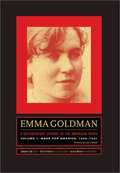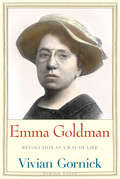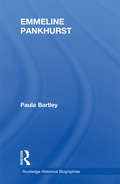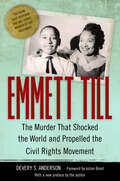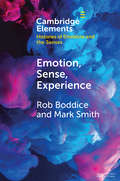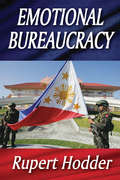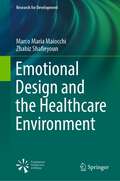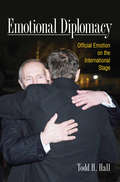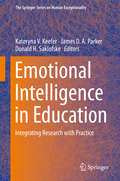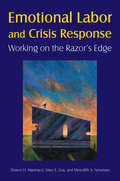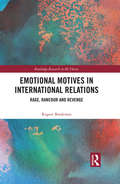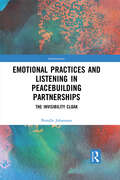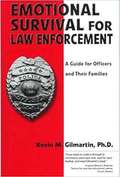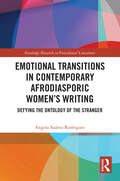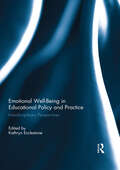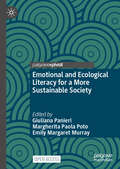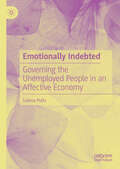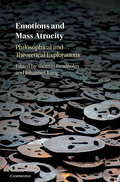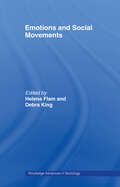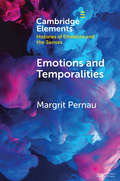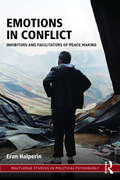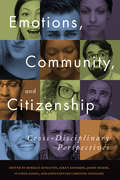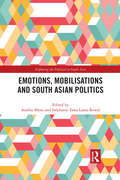- Table View
- List View
Emma Goldman: A Documentary History of the American Years
by Candace FalkEmma Goldman: A Documentary History of the American Years redefines the historical memory of Emma Goldman and illuminates a forgotten yet influential facet of the history of American and European radicalism. This definitive multi-volume work, which differs significantly from Goldman's autobiography, presents original texts--a significant group of which are published in or translated into English for the first time--anchored by rigorous contextual annotations. The distillation of years of scholarly research, these volumes include personal correspondence, newspaper articles, government surveillance reports from America and Europe, dramatic court transcripts, unpublished lecture notes, and an array of other rare items and documentation. Biographical, newspaper, and organizational appendixes are complemented by in-depth chronologies that underscore the complexity of Goldman's political and social milieu. The first volume,Made for America, 1890-1901,tracks the young Emma Goldman's introduction into the anarchist movement, features her earliest known writings in the German anarchist press, and charts her gradual emergence from the radical immigrant circles of New York City's Lower East Side into a political and intellectual culture of both national and international importance. Goldman's remarkable public ascendance is framed within a volatile period of political violence: within the first few pages, Henry Clay Frick, the anti-union industrialist, is shot by Alexander Berkman, Goldman's lover; the book ends with the assassination of President William McKinley, an act in which Goldman was falsely implicated. The documents surrounding these events shed light on difficult issues--and spark an important though chilling debate about Goldman's strategy for reconciling her "beautiful vision" of anarchism and the harsh realities of her times. The documents articulate the force of Goldman's rage, tracing the development of her political and social critique as well as her originality and her remarkable ability to synthesize and popularize cutting-edge political and cultural ideas. Goldman appears as a rising luminary in the mainstream press--a voice against hypocrisy and a lightning rod of curiosity, intrigue, and sometimes fear. The volumes include newspaper accounts of the speaking tours across America that eventually established her reputation as one of the most challenging and passionate orators of the twentieth century. Themes that came to dominate Goldman's life--anarchism and its possibilities, free speech, education, the transformative power and social significance of literature, the position of labor within the capitalist economic system, the vital importance of women's freedom, the dynamics of personal relationships, and strategies for a social revolution--are among the many introduced in Made for America.
Emma Goldman: Revolution as a Way of Life
by Vivian GornickEmma Goldman is the story of a modern radical who took seriously the idea that inner liberation is the first business of social revolution. Her politics, from beginning to end, was based on resistance to that which thwarted the free development of the inner self. The right to stay alive in one's senses, to enjoy freedom of thought and speech, to reject the arbitrary use of power--these were key demands in the many public protest movements she helped mount. Anarchist par excellence, Goldman is one of the memorable political figures of our time, not because of her gift for theory or analysis or even strategy, but because some extraordinary force of life in her burned, without rest or respite, on behalf of human integrity--and she was able to make the thousands of people who, for decades on end, flocked to her lectures, feel intimately connected to the pain inherent in the abuse of that integrity. To hear Emma describe, in language as magnetic as it was illuminating, what the boot felt like on the neck, was to experience the mythic quality of organized oppression. As the women and men in her audience listened to her, the homeliness of their own small lives became invested with a sense of drama that acted as a catalyst for the wild, vagrant hope that things need not always be as they were. All you had to do, she promised, was resist. In time, she herself would become a world-famous symbol for the spirit of resistance to the power of institutional authority over the lone individual. In Emma Goldman, Vivian Gornick draws a surpassingly intimate and insightful portrait of a woman of heroic proportions whose performance on the stage of history did what Tolstoy said a work of art should do: it made people love life more.
Emmanuel Levinas and the Politics of Non-Violence
by Victoria Tahmasebi-BirganiFrench philosopher and Talmudic commentator Emmanuel Levinas (1906-1995) has received considerable attention for his influence on philosophical and religious thought. In this book, Victoria Tahmasebi-Birgani provides the first examination of the applicability of Emmanuel Levinas' work to social and political movements. Investigating his ethics of responsibility and his critique of the Western liberal imagination, Tahmasebi-Birgani advances the moral, political, and philosophical debates on the radical implications of Levinas' work.Emmanuel Levinas and the Politics of Non-Violence is the first book to closely consider the affinity between Levinas' ethical vision and Mohandas Gandhi's radical yet non-violent political struggle. Situating Levinas' insights within a transnational, transcontinental, and global framework, Tahmasebi-Birgani highlights Levinas' continued relevance in an age in which violence is so often resorted to in the name of "justice" and "freedom."
Emmeline Pankhurst (Routledge Historical Biographies)
by Paula BartleyIn this well-structured, fluent and lively account, Paula Bartley uses new archival material to assess whether Pankhurst should be seen as a heroine or a tyrant, a conservative or a progressive. Emmeline Pankhurst was the most prominent campaigner for the women's right to vote and was transformed into a popular heroine of the early twentieth century. Early in life she was attracted to socialism, she grew into an entrenched and militant suffragette and ended up as a Conservative Party candidate. This new biography examines the guiding principles that underpinned all of Emmeline Pankhurst's actions, and places her achievements within a wider social and political context.
Emmett Till: The Murder That Shocked the World and Propelled the Civil Rights Movement (Race, Rhetoric, and Media Series)
by Devery S. AndersonEmmett Till: The Murder That Shocked the World and Propelled the Civil Rights Movement offers the first, and as of 2018, only comprehensive account of the 1955 murder, the trial, and the 2004-2007 FBI investigation into the case and Mississippi grand jury decision. By all accounts, it is the definitive account of the case. It tells the story of Emmett Till, the fourteen-year-old African American boy from Chicago brutally lynched for a harmless flirtation at a country store in the Mississippi Delta. Anderson utilizes documents that had never been available to previous researchers, such as the trial transcript, long-hidden depositions by key players in the case, and interviews given by Carolyn Bryant to the FBI in 2004 (her first in fifty years), as well as other recently revealed FBI documents. Anderson also interviewed family members of the accused killers, most of whom agreed to talk for the first time, as well as several journalists who covered the murder trial in 1955. Till's murder and the acquittal of his killers by an all-white jury set off a firestorm of protests that reverberated all over the world and spurred on the civil rights movement. Like no other event in modern history, the death of Emmett Till provoked people all over the United States to seek social change. Anderson's exhaustively researched book was also the basis for the ABC miniseries Women of the Movement, which was written/executive-produced by Marissa Jo Cerar; directed by Gina Prince-Bythewood, Tina Mabry, Julie Dash, and Kasi Lemmons; and executive-produced by Jay-Z, Jay Brown, Tyran “Ty Ty” Smith, Will Smith, James Lassiter, Aaron Kaplan, Dana Honor, Michael Lohmann, Rosanna Grace, Alex Foster, John Powers Middleton, and David Clark. For over six decades the Till story has continued to haunt the South as the lingering injustice of Till's murder and the aftermath altered many lives. Fifty years after the murder, renewed interest in the case led the Justice Department to open an investigation into identifying and possibly prosecuting accomplices of the two men originally tried. Between 2004 and 2005, the Federal Bureau of Investigation conducted the first real probe into the killing and turned up important information that had been lost for decades. Anderson covers the events that led up to this probe in great detail, as well as the investigation itself. This book will stand as the definitive work on Emmett Till for years to come. Incorporating much new information, the book demonstrates how the Emmett Till murder exemplifies the Jim Crow South at its nadir. The author accessed a wealth of new evidence. Anderson made a dozen trips to Mississippi and Chicago over a ten-year period to conduct research and interview witnesses and reporters who covered the trial. In Emmett Till, Anderson corrects the historical record and presents this critical saga in its entirety.
Emotion, Sense, Experience (Elements in Histories of Emotions and the Senses)
by Mark Smith Rob BoddiceEmotion, Sense, Experience calls on historians of emotions and the senses to come together in serious and sustained dialogue. The Element outlines the deep if largely unacknowledged genealogy of historical writing insisting on a braided history of emotions and the senses; explains why recent historical treatments have sometimes profitably but nonetheless unhelpfully segregated the emotions from the senses; and makes a compelling case for the heuristic and interpretive dividends of bringing emotions and sensory history into conversation. Ultimately, we envisage a new way of understanding historical lived experience generally, as a mutable product of a situated world-brain-body dynamic. Such a project necessarily points us towards new interdisciplinary engagement and collaboration, especially with social neuroscience. Unpicking some commonly held assumptions about affective and sensory experience, we re-imagine the human being as both biocultural and historical, reclaiming the analysis of human experience from biology and psychology and seeking new collaborative efforts.
Emotional Bureaucracy
by Rupert HodderThis study casts doubt on the classic model of bureaucracy and its relevance to developing areas. In particular, Hodder challenges the Weberian distinction between the role of emotion and a modern bureaucracy's impersonal and rational qualities. He suggests that bureaucracies function differently, and offers a different perspective. The focus is the Philippines, but Hodder's conclusions are applicable to other developing areas.Two main themes are discussed. The first explores the classic Weberian model of bureaucracy. The second concerns ways of thinking about the social features of bureaucracy. The focus is dimensions of bureaucracy that are less dependent upon structure. What emerges is an innovative description of the social world of bureaucracy and its attributes.Hodder observes that discussions with civil servants and politicians in developing countries suggest that deepening emotion, a strengthening sense of the importance of social relationships, and informality are vital to the emergence of professional and stable organizations. Hodder believes it is possible to account for these social features of bureaucracy by understanding participants' representations and practices.While these ideas are discussed in the context of the Philippines, they have wider relevance to other states, especially those whose bureaucracies are characterized as weak and personalistic. The author suggests that these characterizations, and possible remedies, may need to be reconsidered. He argues that through informality and emotion, effective and stable organizations can be built: excessive formalism may exacerbate the problems that governments of developing countries are trying to solve. The means to strengthen bureaucracies in developing countries are already available and, rather than be ignored or suppressed, need be identified and encouraged.
Emotional Design and the Healthcare Environment (Research for Development)
by Marco Maria Maiocchi Zhabiz ShafieyounFor all of the tremendous advances in medicine and treatment the world has seen in the modern era, the human body’s ability to heal itself remains a (literally) vital and often overlooked facet of healthcare. Through the use of emotional design, aimed at transforming healthcare environments, such as waiting rooms, in such a way as to boost the emotional wellbeing of patients, and thus their general attitudes, including in regard to their own healing processes, medical institutions can improve outcomes for the people they treat while simultaneously lowering overall costs. Design, as an inherently transdisciplinary, problem-solving activity, is well-suited to this task. And when combined with a field of study such as neuroscience, which can literally map out the perceptions that lead to the experience of particular emotions, healthcare environments can be transformed into spaces (through such innovations as Kansei engineering) that then subsequently transform the people who rely on them the most, leading to more efficiency and less red ink.
Emotional Diplomacy: Official Emotion on the International Stage
by Todd H. HallIn Emotional Diplomacy, Todd H. Hall explores the politics of officially expressed emotion on the international stage, looking at the ways in which state actors strategically deploy emotional behavior to shape the perceptions of others. Examining diverse instances of emotional behavior, Hall reveals that official emotional displays are not simply cheap talk but rather play an important role in the strategies and interactions of state actors. Emotional diplomacy is more than rhetoric; as this book demonstrates, its implications extend to the provision of economic and military aid, great-power cooperation, and even the use of armed force. Emotional Diplomacy provides the theoretical tools necessary for understanding the nature and significance of state-level emotional behavior and offers new observations of how states seek reconciliation, strategically respond to unforeseen crises, and demonstrate resolve in the face of perceived provocations. Hall investigates three specific strands of emotional diplomacy: those rooted in anger, sympathy, and guilt. Presenting original research drawing on sources and interviews in five different languages, Hall provides new insights into the 1995–1996 Taiwan Strait Crisis, the post-9/11 reactions of China and Russia, and relations between West Germany and Israel after World War II. He also demonstrates how his arguments can be extended to further cases ranging from Sino-Japanese relations to diplomatic interactions in Latin America. Emotional Diplomacy offers a unique take on the intersection of strategic action and emotional display, offering a means for making sense of why states appear to behave emotionally.
Emotional Intelligence in Education: Integrating Research with Practice (The Springer Series on Human Exceptionality)
by James D. Parker Donald H. Saklofske Kateryna V. KeeferThis book highlights current knowledge, best practices, new opportunities, and difficult challenges associated with promoting emotional intelligence (EI) and social-emotional learning (SEL) in educational settings. The volume provides analyses of contemporary EI theories and measurement tools, common principles and barriers in effective EI and SEL programming, typical and atypical developmental considerations, and higher-level institutional and policy implications. It also addresses common critiques of the relevance of EI and discusses the need for greater awareness of sociocultural contexts in assessing and nurturing EI skills. Chapters provide examples of effective EI and SEL programs in pre-school, secondary school, and university contexts, and explore innovative applications of EI such as bullying prevention and athletic training. In addition, chapters explore the implications of EI in postsecondary, professional, and occupational settings, with topics ranging from college success and youth career readiness to EI training for future educators and organizational leaders. Topics featured in this book include: Ability and trait EI and their role in coping with stress, academic attainment, sports performance, and career readiness.Implications of preschoolers’ emotional competence for future success in the classroom.Understanding EI in individuals with exceptionalities.Applications of school-based EI and SEL programs in North America and Europe.Policy recommendations for social-emotional development in schools, colleges and universities.Developing emotional, social, and cognitive competencies in managers during an MBA program.Emotional intelligence training for teachers.Cross-cultural perspective on EI and emotions. Emotional Intelligence in Education is a must-have resource for researchers, professionals, and policymakers as well as graduate students across such disciplines as child and school psychology, social work, and education policy.
Emotional Labor and Crisis Response: Working on the Razor's Edge
by Mary E. Guy Sharon H. Mastracci Meredith A. NewmanThe author's of the award-winning Emotional Labor now go inside the stressful world of suicide, rape, and domestic hotline workers, EMTs, triage nurses, and agency/deparment spokespersons, to provide powerful insights into how emotional labor is actually exerted by public servants who face the gravest challenges.
Emotional Motives in International Relations: Rage, Rancour and Revenge (Routledge Research in International Relations Theory)
by Rupert BrodersenThe study of emotions in International Relations is gaining wide-spread attention. Within the "emotional turn" in IR the emotion of rage however has not been given sufficient attention, instead being used as short-hand for irrationality and excess. Rage is arguably one of the oldest and most destructive emotions in human affairs. This book offers an innovative approach that seeks to split rage into its traditional manifestation of aggression and violence, and into a less visible, passive manifestation of Nietzschean Ressentiment. This model facilitates a comprehensive understanding of revisionist motivation, from the violence of ISIS to the oppositionism of Putin’s Russia. The aim is to illustrate how a lack of violence can belie vengeful impulses and a silent rage, and how acts of violence, regardless of brutality, are often framed as a type of justice and "moral imperative" in the mind of the aggressor. This book raises serious questions and concerns about legitimacy and order in global affairs, and offers a firm theoretical basis for the exploration of present day conflicts.
Emotional Practices and Listening in Peacebuilding Partnerships: The Invisibility Cloak (Interventions)
by Pernilla JohanssonThis book analyzes the everyday emotions of international peacebuilding practitioners as practices that hinder – and potentially help – them to listen more receptively to their local partners. It develops ‘‘emotional practices’’ as an analytical concept by integrating critical feminist perspectives insights into practice approaches. Effective peacebuilding requires international actors to listen to local partners. This sounds simple enough but often fails in practice. Examining how everyday emotions help or hinder internationals’ receptivity to local perspectives, the book challenges the conventional wisdom that emotions do not matter – at least not those of internationals who are the privileged party in peacebuilding partnerships. The book is based on interviews with peacebuilding practitioners, donors and researchers working in the Balkans and East Africa, as well as in the UK, the US and Sweden, and gives a detailed and no-nonsense description of daily dilemmas regarding listening and partnerships. Johansson provides concrete recommendations of how internationals can practice personally, organizationally, and geopolitically to build emotional capacity that will help them listen better to local actors. Drawing on the author’s expertise in political science and peace and conflict research, this volume speaks to scholars in international relations, political theory, sociology, cultural studies, development studies, critical theory, and anthropology.
Emotional Survival For Law Enforcement: A Guide For Officer And Their Families
by Kevin M. GilmartinEmotional survival for law enforcement: A guide for officers and their families
Emotional Transitions in Contemporary Afrodiasporic Women’s Writing: Defying the Ontology of the Stranger (Routledge Research in Postcolonial Literatures)
by Ángela Suárez-RodríguezThis book is an in-depth study of the category "stranger" as represented in four contemporary Afrodiasporic novels of female authorship: Chimamanda Ngozi Adichie’s Americanah, Sefi Atta’s A Bit of Difference, NoViolet Bulawayo’s We Need New Names and Imbolo Mbue’s Behold the Dreamers. Examined from an interdisciplinary perspective that brings together different approaches to the figure of the stranger and Affect Theory, the plurality of experiences of estrangement, disorientation and unbelonging portrayed in these texts allows expansion upon Sara Ahmed’s (2000) investigation of "stranger fetishism" and, in so doing, contributes to the recent call for a more nuanced understanding of the idea of "stranger". In particular, the critical and comparative study of the different migration experiences of the protagonists reveals that, within the framework of the contemporary African diaspora to the West, "strange(r)ness" is a situated, embodied and emotional condition that depends on the politics of location and of identity from which it emerges. This book will particularly appeal to scholars and students in the fields of Postcolonial Studies, African Diaspora Studies and Black Women’s Literature, and will also be suitable for students at graduate and advanced undergraduate levels in English Studies.
Emotional Well-Being in Educational Policy and Practice: Interdisciplinary Perspectives
by Kathryn EcclestoneSchools in numerous countries around the world have become key sites for interventions designed to enhance the emotional well-being of children and young people, offering new forms of pedagogy and curriculum knowledge informed in ad hoc and eclectic ways by various strands of psychology, counselling and therapy.Responding to C. Wright Mills famous injunction for a ‘sociological imagination this unique inter-disciplinary collection of papers explores ideologies and imperatives that frame contemporary education policy and practice around emotional well-being, ideas and assumptions about the state of childhood today, and the changing nature of the curriculum subject and associated forms of knowledge. In bringing together British and American advocates of behavioural interventions in social and emotional learning alongside critics who draw on historical, philosophical and sociological perspectives, it highlights new and important debates for policy makers, the designers, implementers and evaluators of interventions and those who participate in them.This book was originally published as a special issue of Research Papers in Education.
Emotional and Ecological Literacy for a More Sustainable Society
by Margherita Paola Poto Giuliana Panieri Emily Margaret MurrayThis open access book aims to promote ecological and emotional research and education for sustainability by cultivating values and behaviours consistent with how nature makes us feel connected and nurtured. Built upon the intersection of ecological literacy and socio-emotional learning, grounded in sustainability and relational thinking, the research developed in the book covers a wide range of themes connected to the Agenda 2030.
Emotionally Indebted: Governing the Unemployed People in an Affective Economy
by Sabina PultzThis book explores the lived experience of unemployment from a critical social psychological perspective. It connects the condition of unemployment to governance structures and wider societal issues, such as the labor market tendencies of precarity and enterprise culture. Based on qualitative data collected in Denmark and America, the book gives voice to unemployed people to critically discuss both the intended and unintended consequences of active labor market measures, as well as the frequent moral evaluations that surround unemployment. The author explores how unemployed people make sense of and deal with the demands and activities required by activation policies or ALMPs, which tend to make the job seekers responsible for finding a solution to their condition. Building from the subjective experience of unemployment, it maps the complex emotional demands on jobseekers who should feel shame and self-blame but also display motivation and passion on the labor market. Presenting emotions and feelings as pivotal instruments of the governmentality of worklessness, this book addresses the lack of critical discussion and research into the unemployment experience and offers a useful, provocative perspective for students, scholars, and practitioners alike in social psychology, social policy, economic policy, and related disciplines.
Emotions and Mass Atrocity: Philosophical and Theoretical Explorations
by Thomas Brudholm Johannes LangThe study of genocide and mass atrocity abounds with references to emotions: fear, anger, horror, shame and hatred. Yet we don't understand enough about how 'ordinary' emotions behave in such extreme contexts. Emotions are not merely subjective and interpersonal phenomena; they are also powerful social and political forces, deeply involved in the history of mass violence. Drawing on recent insights from philosophy, psychology, history, and the social sciences, this volume examines the emotions of perpetrators, victims, and bystanders. Editors Thomas Brudholm and Johannes Lang have brought together an interdisciplinary group of prominent scholars to provide an in-depth analysis of the nature, value, and role of emotions as they relate to the causes and dynamics of mass atrocities. The result is a new perspective on the social, political, and moral dimensions of emotions in the history of collective violence and its aftermath.
Emotions and Social Movements (Routledge Advances in Sociology #Vol. 14)
by Helena Flam Debra KingMost research on social movements has ignored the significance of emotions. This edited volume seeks to redress this oversight and introduces new research themes and tools to the field of emotions and social movements. Sociologists and political activists around the world will find this volume to be of great interest due to its wide-ranging approach and its unique emphasis on the role of emotion in protest, dissent and social movements.
Emotions and Temporalities (Elements in Histories of Emotions and the Senses)
by Margrit PernauThis Element brings together the history of emotions and temporalities, offering a new perspective on both. Time was often imagined as a movement from the past to the future: the past is gone and the future not yet here. Only present-day subjects could establish relations to other times, recovering history as well as imagining and anticipating the future. In a movement paralleling the emphasis on the porous self, constituted by emotions situated not inside but between subjects, this Element argues for a porous present, which is open to the intervention of ghosts coming from the past and from the future. What needs investigating is the flow between times as much as the creation of boundaries between them, which first banishes the ghosts and then denies their existence. Emotions are the most important way through which subjects situate and understand themselves in time.
Emotions in Conflict: Inhibitors and Facilitators of Peace Making (Routledge Studies in Political Psychology)
by Eran HalperinSocial and political psychologists have attempted to reveal the reasons why individuals and societies that acknowledge that peace would improve their personal and collective well-being, and are aware of the required actions needed to promote it, are simply incapable of making this step forward. Some social psychologists have advocated the idea that certain societal beliefs and collective memories about the nature of the opponent, the in-group, the history, and the current state of the conflict distort the perceptions of society members and prevent them from identifying opportunities for peace. But these cognitive barriers capture only part of the picture. Could identifying the role of discrete emotions in conflicts and conflict resolution potentially provide a wide platform for developing pinpoint conflict resolution interventions? Using a vast array of primary sources, critical literature analysis, and firsthand personal experiences in various conflict zones (Middle East, Cyprus, Bosnia, and Northern Ireland), Eran Halperin introduces a new perspective on psychological barriers to peace. Halperin focuses on various emotional mechanisms that hamper peace processes, even when parties face real opportunities for conflict resolution. More specifically, he explores how hatred, anger, fear, angst, hope, despair, empathy, guilt, and shame, combined with various emotion regulation strategies, provide emotions-based explanations for people's attitudinal and behavioral reactions to peace-related events during the ongoing process of conflict resolution. Written in a clear and accessible style, Emotions in Conflict offers a thought-provoking and pioneering insight into the role discrete intergroup emotions play in impeding, as well as facilitating, peace processes in intractable conflicts. This book is essential reading for those who study intractable conflicts and their resolutions, and those who are interested in the ‘real-world’ implication of recent theories and findings on emotion and emotion regulation.
Emotions in International Politics
by Jean-Marc Coicaud Ariffin, Yohan and Coicaud, Jean-Marc and Popovski, Vesselin Yohan Ariffin Vesselin PopovskiIn recent years, social scientists have increasingly recognized the interconnectedness of thought on emotions. Nowhere is the role of passions more evident than international politics, where pride, anger, guilt, fear, empathy, and other feelings are routinely on display. But in the absence of an overarching theory of emotions, how can we understand their role at the international level? Emotions in International Politics fills the need for theoretical tools in the new and rapidly growing subfield of international relations. Eminent scholars from a range of disciplines consider how emotions can be investigated from an international perspective involving collective players, drawing evidence from such emotionally fraught events as the Rwandan genocide, World War II, the 9/11 attacks, and the Iranian nuclear standoff. The path-breaking research collected in Emotions in International Politics will be a valuable theoretical guide to understanding conflict and cooperation in international relations.
Emotions, Community, and Citizenship: Cross-Disciplinary Perspectives
by James Mckee Constantine Vassiliou Kiran Banerjee Rebecca Kingston Yi-Chun ChienEmotions are at the very heart of individual and communal actions. They influence our social and interpersonal behaviour and affect our perspectives on culture, history, politics, and morality. Emotions, Community, and Citizenship is a pioneering work that brings together scholars from an array of disciplines in order to challenge and unite the disciplinary divides in the study of emotions. These carefully selected studies highlight how emotions are studied within various disciplines with particular attention to the divide between naturalistic and interpretive approaches. The editors of this volume have provided a nuanced and insightful introduction and conclusion which provide not only an overarching commentary but a framework for the interdisciplinary approach to emotion studies.
Emotions, Mobilisations and South Asian Politics (Exploring the Political in South Asia)
by Amélie Blom Stéphanie Tawa Lama-RewalThis book highlights the role of emotions in the contentious politics of modern South Asia. It brings new methodological, theoretical and empirical insights to the mutual constitution of emotions and mobilisations in India, Pakistan and Bangladesh. As such, it addresses three distinct but related questions: what do emotions do to mobilisations? What do mobilisations do to emotions? Further, what does studying emotions in mobilisations reveal about the political culture of protest in South Asia? The chapters in this volume emphasise that emotions are significant in politics because they have the power to mobilise. They explore a variety of emotions including anger, resentment, humiliation, hurt, despair, and nostalgia, and also enchantment, humour, pleasure, hope and enthusiasm. The interdisciplinary research presented here shows that integrating emotions improves our understanding of South Asian politics while, conversely, focusing on South Asia helps retool current thinking on the emotional dynamics of political mobilisations. The book offers contextual analyses of how emotions are publicly represented, expressed and felt, thus shedding light on the complex nature of protests, power relations, identity politics, and the political culture of South Asia. This cutting-edge research volume intersects South Asian studies, emotion studies and social movement studies, and will greatly interest scholars and students of political science, anthropology, sociology, history and cultural studies, and the informed general reader interested in South Asian politics.
